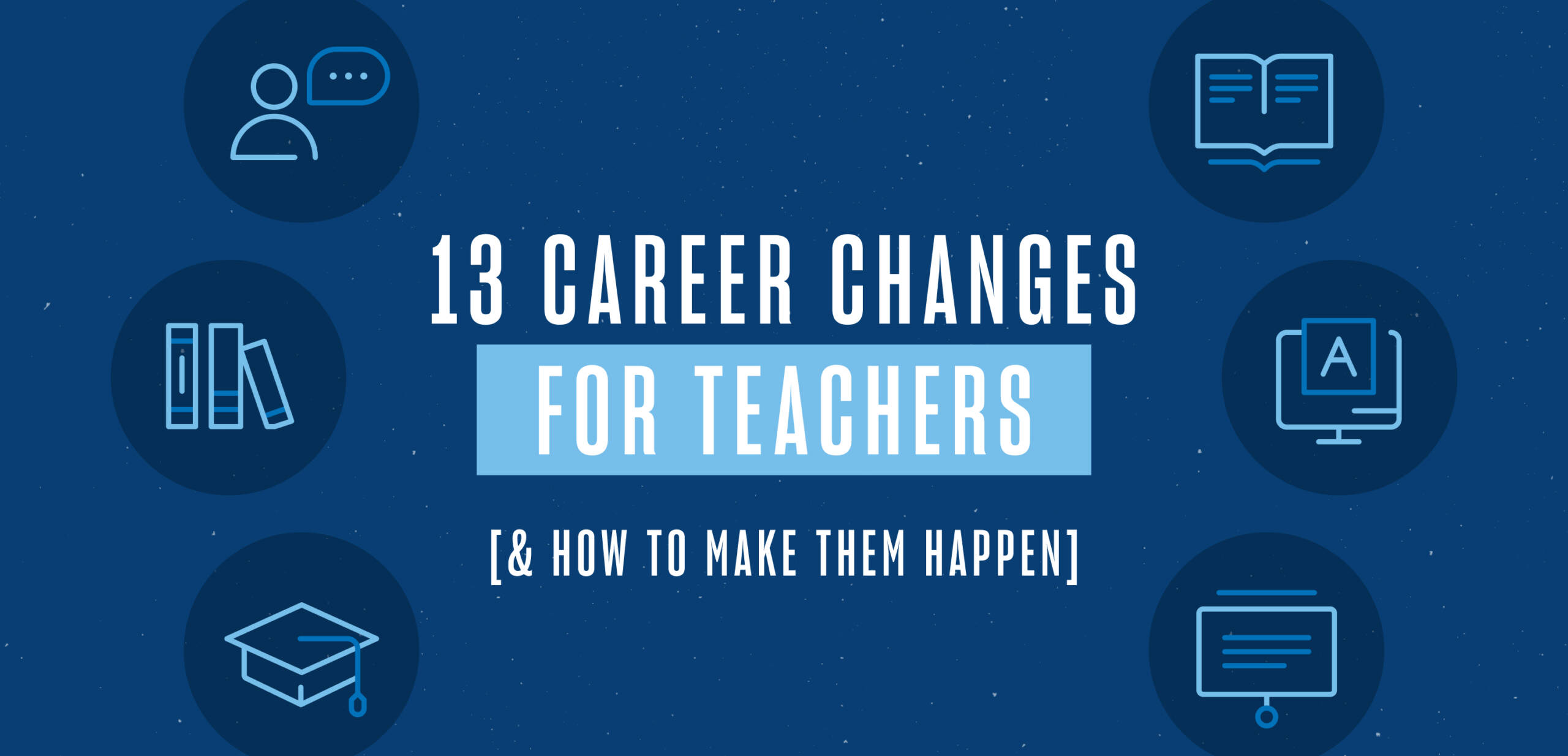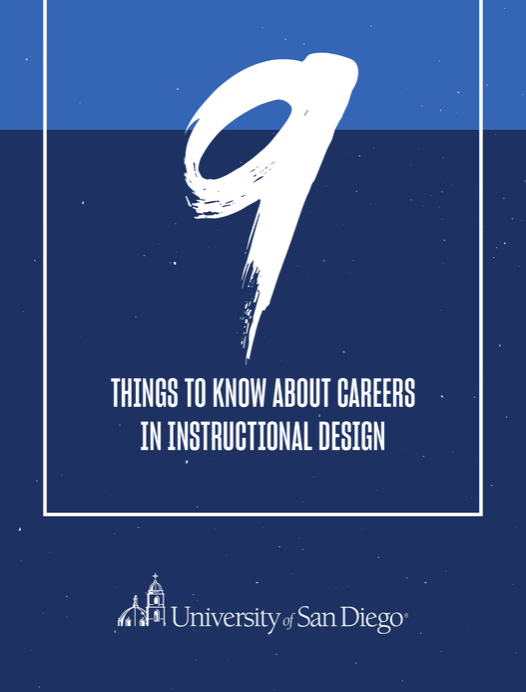Educators possess a unique set of skills that are transferable across many industries. Whether it’s time management, copy editing, user experience design, training or communication, teachers have honed abilities applicable in many professional contexts. As more educators explore jobs for teachers outside of education, the opportunity to leverage these skills in different industries continues to expand.
Transitioning from teaching to another career is a significant step that requires patience, effort and persistence. By identifying roles that resonate with your passions and align with your skills, the journey to a new, rewarding career is more navigable.
In this guide, we’ll provide insights into determining if you’re ready for a new role, how to approach the transition and potential career alternatives to teaching based on varied interests.
How to Determine if You’re Ready for a Job Outside Education
Educators considering a departure from their teaching roles should conduct a rigorous self-assessment to gauge their readiness to transition. The employment platform Indeed identifies six indicators that may suggest a need for a career change:
- A noticeable decline in enthusiasm and contentment derived from your work
- Persistent stress from work that adversely impacts your personal life
- A perception that your ideas and contributions are undervalued
- Frequent recommendations from acquaintances to reconsider your career choice
- Inadequate earnings to meet the cost of living
- Recurring contemplation or idealization of alternative employment
Sporadic experiences of work-related stress or feelings of undervaluation are commonplace. However, if you consistently experience these sentiments, it may be time to evaluate your professional status. To do this, educators might ask the following questions:
- What competencies do you possess? This might encompass communication proficiency, acumen in project management or technological adeptness.
- In which tasks or activities do you excel? How does your perception of your strengths correlate with your skill set?
- What ignites your passion? Which tasks or projects excite you?
- How do you envision contributing to society or your community?
- How do your current compensation and benefits align with your needs and aspirations? Absent financial constraints, would your current role still appeal to you?
If the underlying issues seem amenable to resolution then staying the course with your teaching career is recommended.
On the other hand, if the challenges appear deeply entrenched or insurmountable, educators might consider pursuing education-related jobs outside the classroom or leaving the education sector altogether.
[RELATED RESOURCE] Thinking about leaving the classroom? Discover how instructional design can build on your teaching experience.
Transitioning to a New Career After Teaching
Upon thorough self-evaluation, educators may organize their prospective career trajectory into three categories:
- Adapting existing roles to alternate industries — Educators interested in retaining their instructional capacities but venturing outside traditional educational spheres might consider roles such as corporate trainers, learning consultants or private tutors.
- Transitioning to new roles within education — Those who remain committed to the educational sector but seek variation in function might explore roles in school administration and leadership, delve into more personalized spheres as counselors or tap into the creative domain as instructional designers.
- Taking on a career in a new industry — Educators considering leaving the teaching sector entirely have a wide array of professions to explore, opening up opportunities more aligned with their unique skills and interests. Examples of such transitions include roles in corporate communications, human resources, content development or nonprofit management.
The Harvard Business Review underscores the significance of a structured approach to career decisions. With this approach in mind, educators intending to transition should adopt a strategy that includes the following.
- In-depth market research: Scrutinize the job market, both locally and in prospective relocation areas. Identify entities recruiting for desired roles and consider your potential alignment with these positions.
- Assessment of requisite qualifications: Analyze the academic and skill prerequisites for targeted roles. Differentiate between non-negotiable and preferential requirements.
- Skill alignment evaluation: Contrast the job requisites with your transferable skills. Discern the competencies directly applicable and those that need improvement, whether through additional training, certification or other skill development opportunities.
- Gap identification and rectification: Isolate discrepancies in required academic credentials, experiential requisites or certifications. Devise strategies to bridge these gaps, which could entail further training, courses or accreditation processes.
- Tailored application materials: When ready to apply, customize resumes and cover letters to clarify the rationale behind the career shift. Elaborate on how prior experiences have laid the groundwork for the impending transition and highlight the enthusiasm you have for the prospective role.
Top 13 “Outside the Classroom” Jobs to Pursue with a Teaching Degree
Exploring education degree jobs outside the classroom may seem daunting, but with the right strategies, educators can successfully navigate this transition. Here are several alternative careers, categorized by interests, to help guide your search.
Library Sciences
Former teachers passionate about reading, researching and cataloging will find a fulfilling career in library sciences. This field values communication, organization and computer literacy skills and is a natural fit for educators.
- Job Titles: Librarian, Library Media Specialist
- Role and Responsibilities: Manage library resources, assist patrons in finding information and organize library events. Maintain and update library databases.
- Average Salary: $65,193
- Salary Range: $31,000–$102,500 (depending on skill, education and experience level, as well as geographic location and organization type)
- Transferable Teaching Skills: Communication, organization, documentation, computer literacy
- Educational/Experience Requirements: Working as a librarian typically requires a master’s degree in Library Science (MLS). A library media specialist usually holds a bachelor’s degree in a relevant field. Some roles might require teaching certifications.
- How To Get Started: Obtain a degree in Library Science or a related field. Gain experience through internships or volunteer positions in libraries. Consider earning additional certifications in library technology or management.
Corporate Training
Educators who enjoy mentoring and skills instruction can thrive in corporate training. This career utilizes classroom management and lesson planning skills to develop and deliver employee training programs.
- Job Titles: Learning Consultant, Training and Development Specialist
- Role and Responsibilities: Design, develop and deliver training programs for corporate employees. Assess training needs, create instructional materials and evaluate training effectiveness.
- Average Salary: $68,172
- Salary Range: $36,000–$108,000 (depending on skill, education and experience level, as well as geographic location and organization type)
- Transferable Teaching Skills: Classroom management, lesson planning, communication, innovation
- Educational/Experience Requirements: Predominantly, positions call for a bachelor’s degree in a pertinent field, coupled with several years of instructional experience. Certain roles may require specific certifications.
- How To Get Started: Obtain certifications such as Certified Professional in Learning and Performance (CPLP). Gain experience in corporate settings through internships or entry-level training positions.
Curriculum Development
Teachers with a knack for asset creation and educational technology can excel in curriculum development. This role, which focuses on designing educational content and courses, requires writing proficiency and course design expertise.
- Job Titles: Curriculum Designer, eLearning Developer, Instructional Coordinator
- Role and Responsibilities: Create educational materials and curricula for schools, academic institutions, or corporate training programs. Collaborate with educators and subject matter experts.
- Average Salary: $87,652
- Salary Range: $57,500–$134,000 (depending on skill, education and experience level, as well as geographic location and organization type)
- Transferable Teaching Skills: Writing proficiency, course design, technological adeptness, team collaboration
- Educational/Experience Requirements: Most roles require a bachelor’s degree in a field of study and years of course creation experience. Some might ask for proficiency in specified software platforms.
- How To Get Started: Pursue a degree in education or a related field. Gain experience in curriculum design through roles in education or training departments. Familiarize yourself with educational technology tools and platforms.
Human Resources
Former teachers with strong communication and personnel management skills are well-suited for human resources roles. These positions involve managing employee relations, recruitment and organizational development.
- Job Title: Human Resources Manager
- Role and Responsibilities: Manage employee relations, recruitment and training programs. Develop HR policies and ensure compliance with labor laws.
- Average Salary: $86,139
- Salary Range: $39,000–$129,500 (depending on skill, education and experience level, as well as geographic location and organization type)
- Transferable Teaching Skills: Communication, team collaboration, organization, technological familiarity
- Educational/Experience Requirements: Generally, a bachelor’s degree in communications, business, psychology or associated fields, plus experience in personnel management, is needed. Some roles may call for professional association certification.
- How to Get Started: Earn certifications such as Professional in Human Resources (PHR) or Society for Human Resource Management Certified Professional (SHRM-CP). Gain experience through HR internships or entry-level HR positions.
Counseling
Educators who are passionate about guidance and mentoring can transition into counseling. This career emphasizes communication, analytical discernment and empathy while supporting personal and professional growth.
- Job Titles: Counselor, Life Coach
- Role and Responsibilities: Provide guidance and support to individuals or groups. Help clients set and achieve personal or educational goals.
- Average Salary: $52,365
- Salary Range: $26,500–$81,500 (depending on skill, education and experience level, as well as geographic location and organization type)
- Transferable Teaching Skills: Communication, analytical discernment, active listening, empathy
- Educational/Experience Requirements: Many roles require a master’s degree in counseling or psychology, complemented by years of professional experience. Some positions might insist on state-regulated licensing or even a teaching credential.
- How To Get Started: Obtain a master’s degree in counseling or psychology. Gain experience through internships or volunteer counseling positions. Acquire state licensure if required for clinical roles.
Learning Design
Teachers interested in curriculum formulation and pedagogical technology can pursue a career in learning design. This field emphasizes analytical thinking and course design with a focus on creating and improving educational programs and materials.
- Job Titles: Instructional Designer, Learning Designer
- Role and Responsibilities: Develop educational programs and e-learning courses. Design instructional materials and assess their effectiveness.
- Average Salary: $79,711
- Salary Range: $44,000–$124,000 (depending on skill, education and experience level, as well as geographic location and organization type)
- Transferable Teaching Skills: Analytical thinking, course design, technological expertise, communication skills
- Educational/Experience Requirements: Roles typically require a bachelor’s degree in learning design or an analogous field. Some might prefer an advanced degree, particular certifications or teaching credentials.
- How To Get Started: Pursue a degree in instructional design or a related field. Gain experience in e-learning and instructional design through internships or project work. Consider obtaining certifications in instructional design tools and methodologies.
Educational Consulting
For teachers who enjoy providing instruction in various settings, educational consulting offers a dynamic career path. Consultants can pull from their classroom experience to advise on curriculum development, instructional strategies and education policy.
- Job Title: Educational Consultant
- Role and Responsibilities: Advise schools and educational organizations on curriculum development, teaching strategies and academic policies. Conduct workshops and training sessions.
- Average Salary: $94,974
- Salary Range: $45,000–$240,500 (depending on skill, education and experience level, as well as geographic location and organization type)
- Transferable Teaching Skills: Communication, team synergy, analytical prowess, organization
- Educational/Experience Requirements: A bachelor’s degree in education or a related discipline and years of teaching or administrative experience are expected. Some positions might require a master’s degree and familiarity with regional or national education policies.
- How To Get Started: Gain experience in teaching and educational administration. Network with professionals in the education sector. Consider obtaining additional certifications in educational leadership or policy.
Listed job salaries and requirements as of October 2024 sourced from ZipRecruiter.
[FREE GUIDE] Ready for a career change? Explore new opportunities with instructional design.
Additional Tips for Getting Started in a New Career
Individuals with a teaching background possess valuable skills, making them strong candidates for myriad roles, both within and outside the education sector. As you think about transitioning to a new career, consider the following structured approach.
- Conduct comprehensive research: Investigate potential roles, gain insights about prospective employers and understand the educational requirements and experience necessary for specific positions.
- Adopt a forward-thinking mindset: Transitioning careers can present challenges, including potential setbacks. Maintain focus on your reasons for seeking change and keep your overarching goals at the forefront.
- Expand networking efforts: Engage with relevant social media groups or professional networks. Such platforms can be instrumental in unearthing job leads, acquiring advice and gaining insights from individuals who have navigated similar career transitions.
- Develop a professional portfolio: Beyond the conventional resume and cover letter, curate a portfolio that encapsulates your most noteworthy accomplishments relevant to your desired role. For instance, aspiring curriculum designers might include example lesson plans, while prospective mentors or counselors could incorporate testimonials illustrating their interpersonal strengths.
- Seek relevant academic programs: Identifying and enrolling in programs aligned with the intended career trajectory can be beneficial. For example, the MS in Learning Design and Technology, offered through the University of San Diego, is tailored for those seeking roles in instructional design.
How To Choose the Right Job After Teaching
Here are four key tips to help you choose the right job after a teaching career:
Identify Your Interests
Determine what genuinely interests you. Whether it’s mentoring, educational content creation or corporate roles, your interests should guide your career choices.
Leverage Your Teaching Skills
Evaluate your transferable skills such as communication, organization and analytical thinking. Match these skills with potential roles in various industries.
Clarify Your Motivations
Understand your reasons for leaving teaching. Whether it’s for better work-life balance, higher pay, or new challenges, your motivations should influence your career decisions.
Research and Network
Explore potential careers and connect with professionals in those fields. Informational interviews and networking can provide valuable insights and help you make informed decisions.
Where Do Former Teachers Work?
Teachers possess a unique set of skills that extend far beyond the classroom, making them valuable assets in various industries. Transitioning to new career paths enables them to leverage their strengths in dynamic and impactful roles. The following sectors and companies, identified through LinkedIn job listings as of July 2, 2024, actively seek the expertise of former teachers:
Corporate Sector
Former teachers excel in the corporate world, especially in roles related to training, human resources and consulting. They bring strong organizational, communication and leadership skills that are invaluable for developing training programs, managing employee relations and improving organizational processes.
Examples:
- Georgia-Pacific LLC: Learning and Development Leader
- AtriCure, Inc.: Training and Digital Education Specialist
- Scholastic: Scholastic Literacy Initiatives Inside Sales Representative
- Monterey Bay Aquarium: Senior Education Specialist – Elementary Educator Programs
Nonprofit and Social Impact Organizations
Nonprofit and social impact organizations benefit greatly from the organizational and leadership abilities of former teachers. These professionals are adept at program management, fundraising and community outreach, all of which are critical for nonprofit success.
Examples:
- Unaccompanied Students Initiative: Laramie Program Coordinator
- Fox Valley Literacy: AmeriCorps Community Corps Member
- GLIDE: eLearning Training Specialist
- Acumen: Senior Associate, Learning & Design Curriculum
Educational Technology
EdTech companies thrive on the expertise of former teachers who can design and deliver educational content. Their experience in curriculum development and instructional design is essential for creating effective online learning experiences.
Examples:
- SMART Technologies: Education Solution Consultant, Lumio (Software)
- Imagine Learning: Curriculum Advisor
Healthcare
In the healthcare sector, former teachers find rewarding roles in patient education and training. Their ability to convey complex information clearly and effectively is crucial for educating patients and training healthcare staff.
Examples:
- ClearChoice Dental Implant Centers: Patient Education Consultant
- Tactile Medical: Patient Education Consultant
Government and Public Policy
Teachers’ analytical and organizational skills make them well-suited for roles in education policy, public administration and community development within government agencies. These positions often involve policy development, program oversight and community engagement.
Examples:
- New Jersey Department of Children and Families: Consultant, Curriculum & Instruction
- Public Consulting Group: Curriculum & Instruction Specialist
- Partnership HealthPlan of California: Education Specialist





